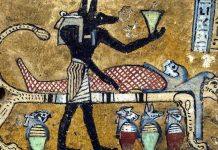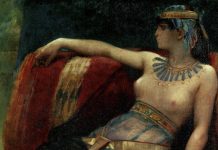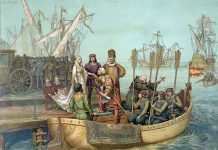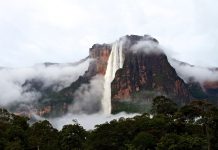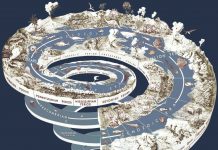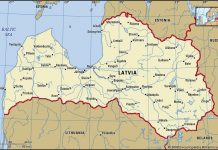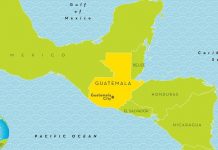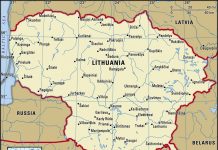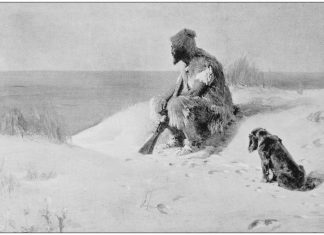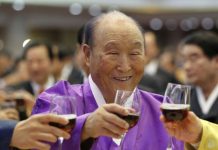Area: 329,768 sq km/127,320 sq mi
Population: 20 103,000
Population density per sq. km/sq. mile: 61/158
Ethnic composition
58% of the population are Malays, of which /5 live in rural areas; 32% are ethnic Chinese, % of whom live in cities, and 9% are ethnic Indians, mainly Tamils. The official language is Malaysian; Chinese, Tamil and English are also spoken. The Constitution records the superiority of ethnic Malays over other ethnic groups; thus, only ethnic Malays can be the head of State or Prime Minister. However, the settlement of Malays across the country is very uneven. In the east of Malaysia, Malays make up less than V3 of the population; In Sarawak, the majority of the population are Ibans, and in Saban — Kadazans.
Religion
54% of the population profess Sunnism; 19% – Buddhism, 7% – Christianity, with about V3 Christians living in eastern Malaysia, 12% are followers of Confucianism and Taoism, and the indigenous tribes of Sabah and Sarawak are animists. The official State religion is Islam. Each state has its own spiritual leader; it is the ruler of the state.
History
In order to better understand the history of the country, you need to start by studying its geographical location. The Federation of Malaysia consists of two large regions: Western Malaysia, located on the peninsula of Malaysia, comprising 11 states, on the territory of which 83% of the population live, and East Malaysia, located in the northeast of Borneo and consisting of the states of Sabah and Sarawak, the southern and central parts of the island belong to Indonesia. On the same island is the independent Sultanate of Brunei, located on the coast of the South China Sea. Brunei borders East Malaysia. The two regions of Malaysia are separated by the South China Sea, the distance between them is 640 km.
The regions of modern Malaysia from the IX to the XIV century were part of the Buddhist empire of Srivid-jaya. The empire was destroyed by the Javanese kingdom of Hindu. Subsequently, Islam was introduced, and before the Portuguese conquest of Malacca in 1511, a significant empire was created. After the Portuguese , the territory of Malaysia was under Dutch control from 1811 to 1824 .
Since the mid-20s of the XIX century, the power of the British Empire has been actively established in the Malaysian region. The economy, especially in the western part, was based on the export of tin and rubber. Chinese and Indian Tamils were imported to work in mines and plantations. Despite the British presence, the local rulers retained considerable political independence. Initially, in 1826, only Singapore, Penang and Malacca officially became part of the British colony. But in 1874, the British protectorate extended to Perak, Selangor, Pahang and Negeri Sembilan. In 1895 All of them entered the Federated Malay States. In 1885, Johor came under the British protectorate.
Then, from 1910 to 1930, protectorate treaties were concluded with Kedah, Perlis, Kerantan and Terengganu. These states, together with Johor, were called Non-Confederate Malay States. Eventually, after the Second World War and after Britain came to control Sarawak in 1948, the protectorates in Borneo and the Malay Peninsula were united in February 1948 and formed the Federation of Malaysia (FM).
After communist uprisings that lasted for several years, in August 1957, FM gained independence as part of the Commonwealth. Six years later, in September 1963, Britain abandoned its crown colonies of Sabah and Sarawak, and thus a new FM was formed consisting of 14 states. North Borneo has been a British Territory since 1881 and was administered by the North Borneo Company until 1946. Sarawak was also a British Territory and since 1841 was administered by the Brooke family. The new Federation initially included the self-governing state of Singapore. However , in August 1965 , Singapore, citing discrimination against the Chinese population, withdrew from the FM.
In the first years of its existence, from 1963 to 1966, FM was attacked by fighters supported by the Indonesian government led by Sukarno, and in 1968 the Philippines put forward claims to the territory of East Malaysia. The first Prime Minister of the country from 1963 to 1969 was Prince Tun-ku Abdul Rahman (1903-1990). His reign was successful because Prince Abdul Rahman was based on the principles of consensus and internationalism. He also headed the Alliance Party founded in 1952. But then, in August 1969, there was an explosion of anti-Chinese protests in Kuala Lumpur, which led to the need to create an emergency government. These speeches occurred after the federal elections revealed a decline in the popularity of the ruling United Malays National Organization (UMNO) and a deep rejection on the part of the Malays of the economic prosperity and wealth of Chinese business circles.
The unrest led to the resignation of Tunku Abdul Rahman in September 1970 and to the creation by the new Prime Minister Tun Abdul Razak of the ruling coalition of 10 (later 13) parties (National Front), which replaced the Alliance Party. The coalition also includes those parties that were previously in opposition. In addition, a new economic policy came into effect in 1971. Its main task was to increase the share of Malay companies from 4% to 30% by 1990. It was also planned to extend the effect of the pro-Malay quota system for university admission and employment. At the same time, emphasis was placed on the development of rural areas in order to achieve economic balance.
In the 1970s, Malaysia began a noticeable economic growth, amounting to more than 7%. But after 1975, problems arose again related to the activities of communist guerrillas on the border with Thailand. In the late 1970s, relations with the Chinese part of the population deteriorated, as the federal government refused to accept refugees from Vietnam. An even more serious problem has been the resurgence of Islamic fundamentalism in the western and northern provinces.
In the fall of 1987, racial contradictions intensified; the reason was the question of teaching the Chinese language and religion. Fearing renewed unrest, Prime Minister Mahathir ordered 106 politicians to be arrested and detained without trial in October-November, including traffic police leader Lim Kit Siang and his deputy Karpal Singh. Among those arrested were journalists, lawyers and leaders of a pressure group. The arrests were carried out on the basis of the provisions of the Internal Security Act. Press censorship was tightened, several newspapers and magazines were closed. All these actions only led to the strengthening of the internal party opposition and to the fact that the moderate wing of the party, led by Razaleigh and supported by former Prime Minister Tunku Abdul Rahman, accused the Prime Minister of authoritarianism.
Eleven dissidents from this wing filed a lawsuit, claiming that the election of the party leader in the previous year was held with violations. In February 1988, the Supreme Court granted their claim and ruled that, since the delegations participating in the voting were not registered, the OMNO was an illegal association and the 1987 elections were declared invalid.
All this led to a serious constitutional crisis and called into question the legitimacy of the current Government. However, thanks to the support of the Head of State, Tunku Mahmoud Iskander, and subsequent favorable judicial decisions, Prime Minister Mahathir survived the storm. Initially, the moderate wing of the OMNO, led by Razaleigh and Rahman, tried to register a new party “OMNO Malaysia”, but the registration bureau refused them. In response, Mahathir submitted an application for the creation of a “New OMNO” (OMNO Baru), which did not include “dissidents” from the old OMNO. His request was granted.
Despite the fact that Mahathir remained afloat after the political crisis in February 1988, his position was soon seriously undermined. The new “OMNO Baru” suffered a crushing defeat during the by-elections organized by the opposition in August 1988. Additional disputes were caused by the adoption in March 1988 of a constitutional amendment that limited the right of the court to interpret laws, as well as the removal from the post of the supreme judge. In July 1988 The National Front won a clear victory in the anti-government elections, although it retained only 71% of the 84% of parliamentary seats it won in August 1986.





